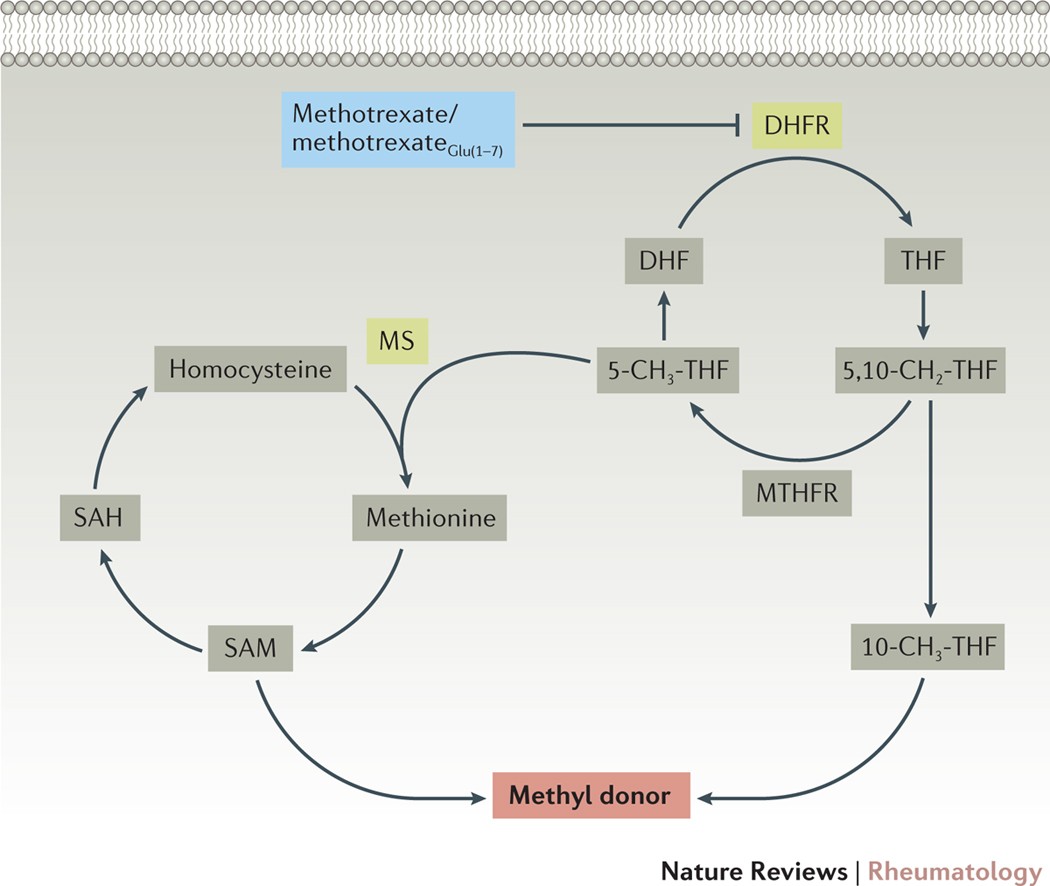Methotrexate (MTX)

Methotrexate (MTX): Definition and Characteristics
What is Methotrexate?
Methotrexate (MTX) is a folate antagonist medication widely used as both a chemotherapy agent and a disease-modifying antirheumatic drug (DMARD) for autoimmune diseases such as rheumatoid arthritis and psoriasis. It impedes cell growth and proliferation by inhibiting key enzymes involved in DNA, RNA, and protein synthesis, exerting both anti-inflammatory and immunosuppressive effects.
Characteristics
Mechanism
Methotrexate primarily inhibits dihydrofolate reductase (DHFR), an enzyme crucial for converting dihydrofolate to tetrahydrofolate, which is necessary for nucleotide synthesis. This inhibition blocks DNA synthesis and cell division, particularly in rapidly dividing cells like cancer cells and activated immune cells. Methotrexate also forms polyglutamates that inhibit other enzymes such as thymidylate synthase and aminoimidazole carboxamide ribonucleotide transformylase (AICART), resulting in the accumulation of adenosine, a potent anti-inflammatory mediator. Additional immunomodulatory effects include inhibition of interleukin-1 beta binding and nuclear factor-κB signaling.
Uses and Side Effects
Methotrexate is effective in controlling malignant cell proliferation and reducing autoimmune inflammation. It is prescribed weekly for autoimmune diseases and in higher doses for chemotherapy. Common side effects include nausea, mucositis, liver toxicity, and bone marrow suppression, necessitating close monitoring during treatment.
Risk Factors
Patients with pre-existing liver or kidney disease, or those on concomitant immunosuppressants, require careful dosing and monitoring. Folic acid supplementation is commonly recommended to reduce adverse effects without lessening efficacy.
Clinical Significance
Methotrexate remains one of the most important drugs in oncology and rheumatology due to its efficacy and cost-effectiveness. Its multitargeted mechanisms offer significant therapeutic benefits but require vigilant management of side effects.
Key Points
- Inhibits folate-dependent enzymes to block DNA/RNA synthesis.
- Anti-inflammatory action via adenosine accumulation and cytokine inhibition.
- Used in cancer and autoimmune disease treatment with dose monitoring.
- Side effects include gastrointestinal issues, liver toxicity, and immunosuppression.
- Folic acid reduces toxicity in many cases.
Consult with Our Team of Experts Now!
For personalized methotrexate therapy, monitoring, and side effect management, consult our oncology and rheumatology specialists for comprehensive and safe care using Cellular Therapy and Stem Cells.
References:
Cronstein BN. The mechanism of action of methotrexate. Rheum Dis Clin North Am. 1997 Nov;23(4):739-55. doi:10.1016/s0889-857x(05)70358-6. Available at: https://doi.org/10.1016/s0889-857x(05)70358-6[1]
Additionally, for more recent detailed insights:
Cronstein BN, Aune TM. Methotrexate and its mechanisms of action in inflammatory arthritis. Nat Rev Rheumatol. 2020 Feb;16(3):145-154. doi:10.1038/s41584-020-0373-9. Available at: https://doi.org/10.1038/s41584-020-0373-9















